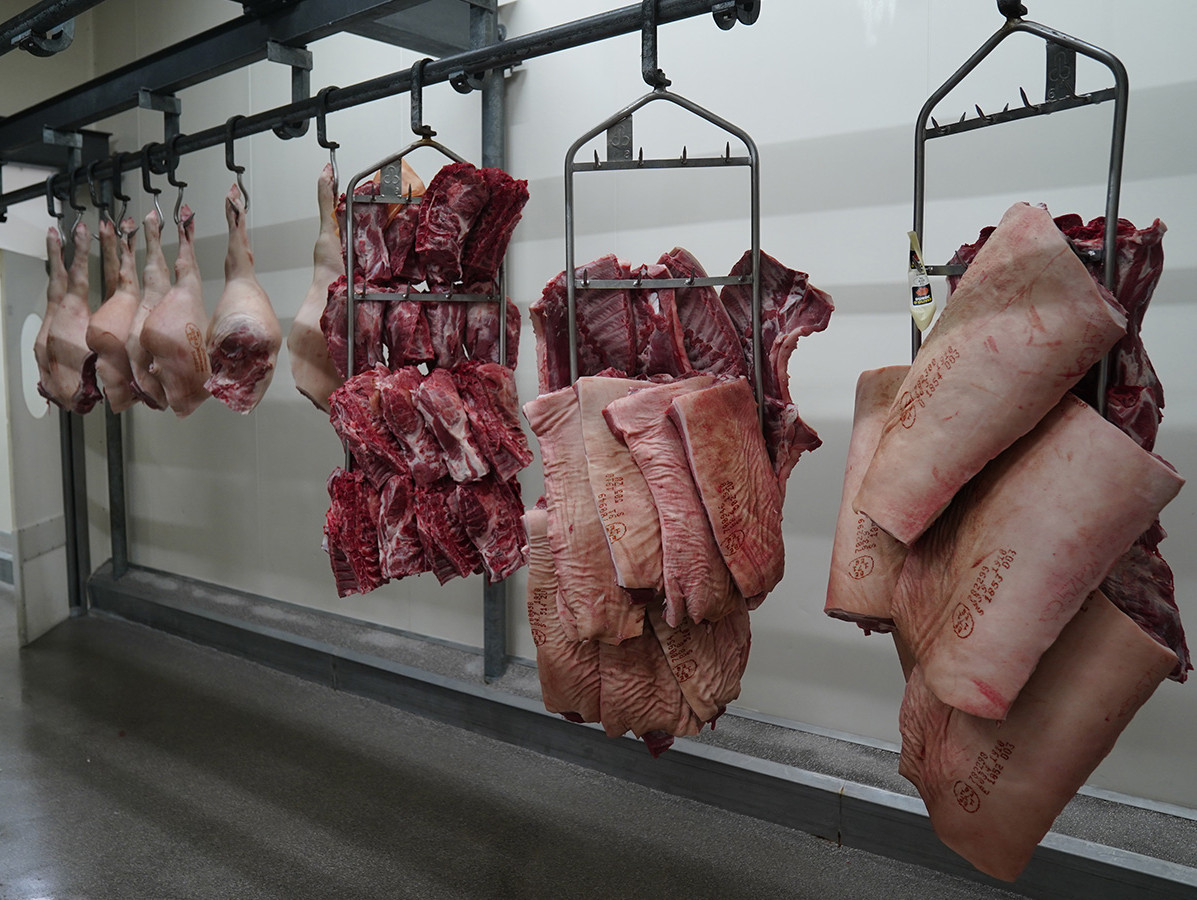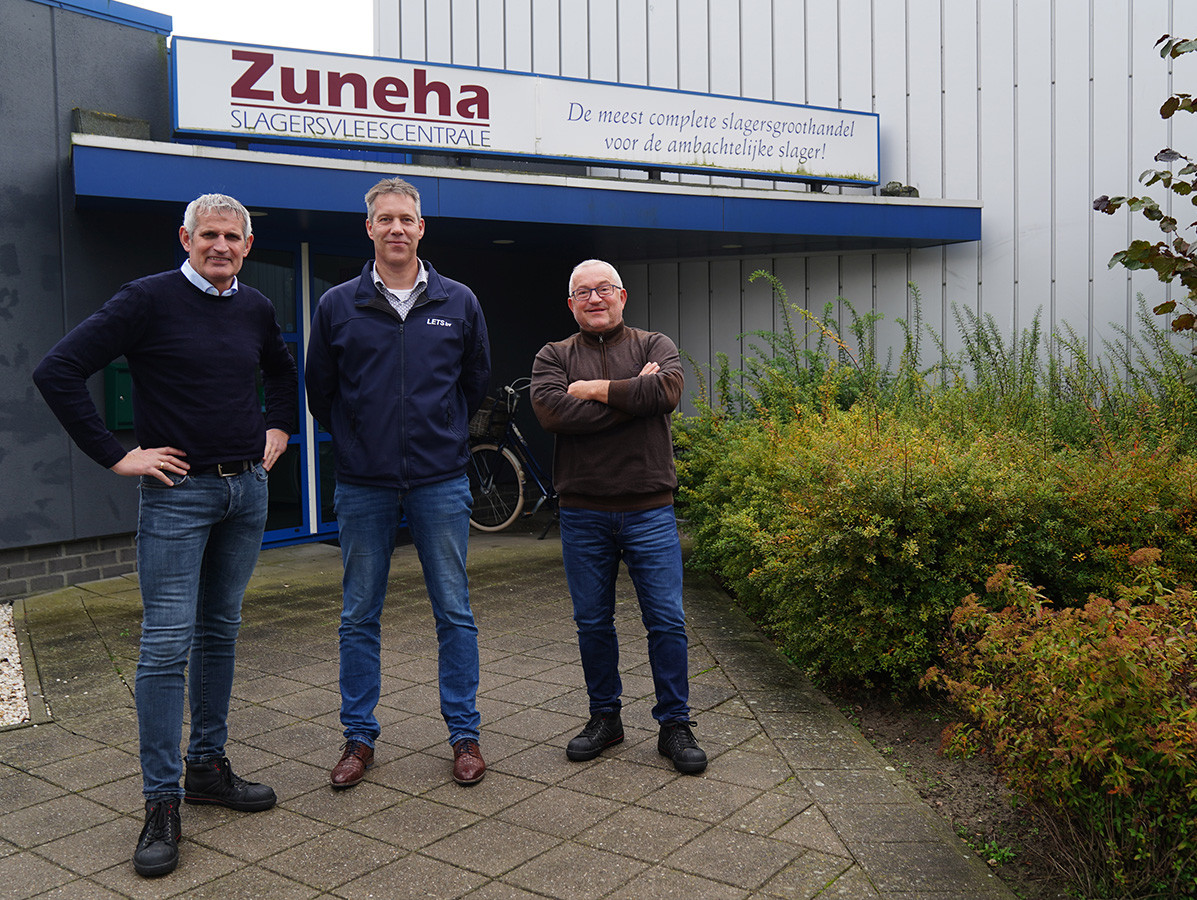
Zuneha supplies fresh meat to the butchery industry. Recently, the medium-sized company invested in a new CO2 refrigeration system with heat recovery. The heat from the chillers is used to heat the water; thus, substantial savings can be made on gas consumption.
Zuneha is originally a family business. The company, founded in 1960, was initially a wholesaler and supplied dry groceries to shops in the area. Meat processing was gradually added and is now the company's core business. In 2000, Zuneha moved from Halsteren to Tholen. At the helm are directors René Visser and René van Dijke. "I always had the ambition to have my own business," Visser says. He has now been working for the company for 34 years and was able to take over from the Moerland family. "I still enjoy going to work." Like all Zuneha employees, he is fully involved in the company. "Our employees jump in everywhere. No one has a set job description, people help where necessary. Only deboning is done by our specialists."
Zuneha supplies fresh meat - beef, chicken, turkey and pork - to butchers. In addition, the company deals in ready-made sauces and salads. Orders are delivered fresh daily. "I don't really believe in frozen meat," Visser says. "We opt for fresh. Quality and affordability are paramount, and animal welfare is also important to us. Our pork comes from Duroc d'Olives pigs, a Belgian breed of pig. In Belgium they don't use a star system like in the Netherlands, but translated to our system you can say it's pork with two stars." Sustainability is also important to Zuneha. The company is doing as much as possible; for the environment as well as to save costs. A year and a half ago, they therefore invested in new refrigeration units, and in a heat recovery system supplied by LETS bv. "The heat is used to heat the water for cleaning and handwashing." LETS is a long-time supplier for Zuneha; other installations were also purchased from them. "We have been doing business together for over 20 years. They have also supplied a compressed air system, high-pressure cleaner and water softener," Visser said.

From left to right René Visser, Guustaaf Hoekstra and René van Dijke
"Our old chillers were outdated," he continues. "They had not yet been written off, but for environmental reasons we opted for a new cooling installation. The cost issue also played a role: chemical refrigerants, needed for those old coolers, are increasingly difficult to obtain and therefore expensive."
Guustaaf Hoekstra, managing director of LETS explains the advantages of such an installation: "CO2 as a refrigerant is not harmful to the environment, and is not flammable, toxic or explosive. It requires significantly less energy to produce CO2 than chemical refrigerants. In addition to being more energy-efficient, CO2 refrigeration systems are also cost-saving in the longer term. Thanks to the high temperatures on the high-pressure side of the CO2 compression cycle, heat can be recovered. This makes this type of refrigeration an ecologically, energetically and economically sensible solution."
"A heat recovery system can be very interesting for companies, especially if the company uses hot water," Hoekstra said. "Especially with today's gas prices, it is an interesting investment. The payback time of such an installation has come down to 1 to 3 years with today's prices. Previously, it was 5 to 7 years. However, not all chillers are suitable for heat recovery. It is therefore important to get proper advice on this."
In order to determine what a company needs in terms of installation and water storage, and to be able to give good advice, LETS always has an extensive discussion with the customer in the early stages. Hoekstra: "What capacity does one need in terms of heating? Does additional heating need to be provided? This is to avoid over- or undercapacity. It is a waste to opt for a heavier installation and larger water tank than necessary."
One of the conditions for Zuneha when replacing the chillers and installing the heat recovery system was that the business could continue to operate as usual. "That is why we had a cooling container installed temporarily," he says. The CO2 plant and reservoir are outside the company, in containers that are connected to each other. "Inside, we had no place for the installation, so this was a great solution. We have a storage with capacity for eight thousand litres of water, which is kept at a constant temperature. This gives us enough capacity for cleaning operations. In the unlikely event of a malfunction in the system, we can still fall back on the old system and heat the water using a gas connection. So far, we didn't have to do that. It runs like a charm." Hoekstra: "The new cooling units with heat recovery system really add value to the business here. This investment will pay for itself in the foreseeable future."
Photos: Naomi Heidinga
Source: Vakblad Voedingsindustrie 2022